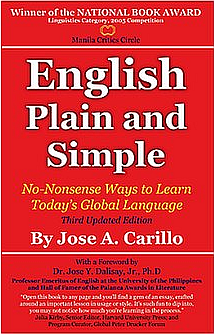When Jose Carillo’s English-language services company ran a want ad for editors sometime in 2003, close to 100 applicants applied by e-mail. Practically all of them had at least an AB degree in English, mass communication, or the social sciences; three were magna cum laudes and six cum laudes; and 10 even had Master’s degrees. Disconcertingly, however, most of their job application letters were worded and constructed in unbelievably strange, convoluted, stilted English like the one that's reproduced below verbatim:
“Dear Sir/Madam:
“Greetings in Peace!
“Responding with utmost immediacy to your job opportunity ad published on January 6, ____ in the __________, I wish to inform you of my fervor interest in applying for the position of Editor. I am an AB graduate of the University of ______ with distinct recognition as a leader and achiever in the field of debating and as editor-in-chief of the student publication, journals, and other newsletters of the academe.
[The applicant then gives a glowing three-paragraph work experience description.]
“For your evaluation, I am enclosing my résumé as an attachment as a first step in exploring the possibilities of employment in your client’s organization. I would appreciate hearing from you soon.
“Thank you for your consideration and God Bless.” In his book
English Plain and Simple whose third updated edition went off the press last September, Jose Carillo says the English of such job application letters is obviously not the English to use when you want to present yourself in the most favorable way to a prospective employer.

He says: “The truth is that many of us who write in English distrust our own ability to present ourselves in a good light. No matter how educated or experienced we are, we often instinctively assume the persona and voice of someone else when we sit down to write. We take refuge in some pseudo-legal mumbo-jumbo that we think will impress our reader or listener.
“And once we get started in this legal-sounding language, we get snared and become addicted to it. Instead of writing as we would talk, we habitually grasp at these arcane words and phrases in the mistaken belief that like some mantra, they will miraculously make things happen for us.”
Jose Carillo likewise observes that the English of not a few Ph.Ds with a “publish or perish” mindset often verges on gibberish—long, pompous, confused, and empty—like this hardly comprehensible official report, published verbatim in a daily newspaper, by an education official writing on Philippine education indicators:
“Teachers’ skills, training, development and welfare with __ percent of the sample attest to their importance in validating the significant effect of teachers’ welfare on the students. Skills training, welfare and development translated into further studies, seminars and benefits are the determinants of Friday sickness (in cases of teachers posted in far-flung barrios, where teachers will usually miss Friday classes, indicative of their dedication to the learning process of their ward) and the gruesome test of dedication and commitment.” Carillo’s book
English Plain and Simple, which won the National Book Award from the Manila Critics Circle upon its publication in 2005, makes every effort to address this very serious and embarrassing communication inadequacy. It provides systematic but easy-to-follow instructions in English writing that students and teachers alike need to continually develop so they can communicate their thoughts and ideas clearly, simply, and confidently to particular audiences.
-------------------
English Plain and Simple
in its third updated edition is available at National Book Store and Fully Booked branches nationwide. Click this link for the list of outlets. Copies can also be ordered for direct delivery to you by Lazada and Shoppee. For volume orders of 50 copies or more, call the Manila Times Publishing Corp. at Tel. 02-8524-5664 to 67 locals 117 and 222, or 099855388871.